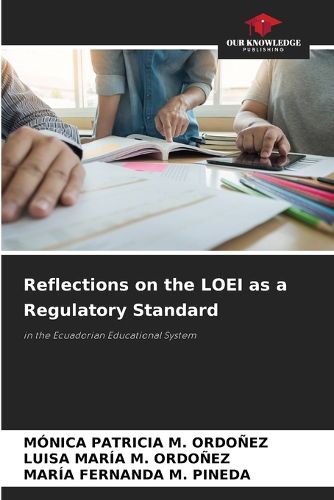Readings Newsletter
Become a Readings Member to make your shopping experience even easier.
Sign in or sign up for free!
You’re not far away from qualifying for FREE standard shipping within Australia
You’ve qualified for FREE standard shipping within Australia
The cart is loading…






The book Reflexiones a la LOEI como Norma Reguladora en el Sistema Educativo Ecuatoriano examines the Ley Organica de Educacion Intercultural (LOEI) and the 2021 reform, assessing its impact on Ecuador's education system. Part I analyzes the educational principles and rights of actors, highlighting that the reform promotes equitable access and inclusion, although it faces challenges in its implementation.Part II addresses the National Education System, highlighting the tension between centralization and decentralization. Although the reform prioritizes centralization to standardize policies, the authors suggest that greater autonomy would allow better adaptation to local needs.Part III addresses bilingual intercultural education, the teaching career, and the regulation of infractions. The reform seeks to strengthen programs for indigenous and Afro-descendant communities and improve the teaching career, although challenges in training and sanctions persist, affecting confidence in the system.In conclusion, the book advocates revising the LOEI to achieve a more fair and inclusive educational system, appropriate to the diversity of Ecuador.
$9.00 standard shipping within Australia
FREE standard shipping within Australia for orders over $100.00
Express & International shipping calculated at checkout
The book Reflexiones a la LOEI como Norma Reguladora en el Sistema Educativo Ecuatoriano examines the Ley Organica de Educacion Intercultural (LOEI) and the 2021 reform, assessing its impact on Ecuador's education system. Part I analyzes the educational principles and rights of actors, highlighting that the reform promotes equitable access and inclusion, although it faces challenges in its implementation.Part II addresses the National Education System, highlighting the tension between centralization and decentralization. Although the reform prioritizes centralization to standardize policies, the authors suggest that greater autonomy would allow better adaptation to local needs.Part III addresses bilingual intercultural education, the teaching career, and the regulation of infractions. The reform seeks to strengthen programs for indigenous and Afro-descendant communities and improve the teaching career, although challenges in training and sanctions persist, affecting confidence in the system.In conclusion, the book advocates revising the LOEI to achieve a more fair and inclusive educational system, appropriate to the diversity of Ecuador.